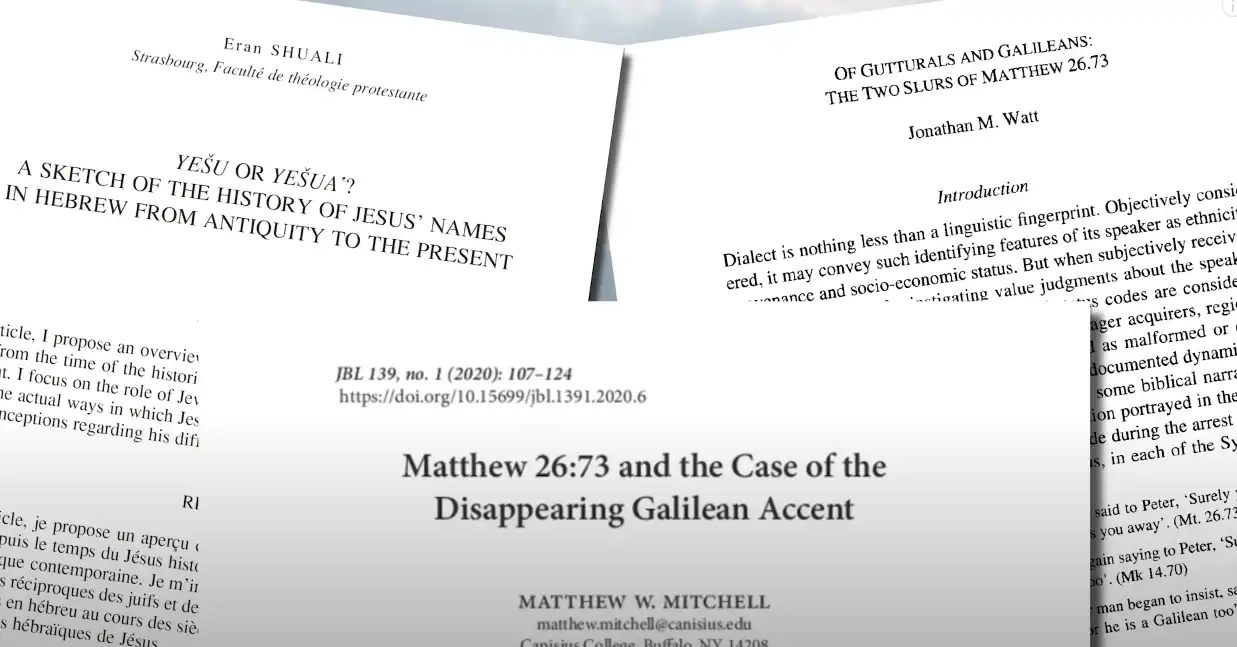When we think of Jesus, we often picture a miracle-working preacher from Nazareth who walked the shores of the Sea of Galilee.
But did you know that the name “Jesus” wasn’t what people called him during his time? If you were to travel back to the first century and call out “Jesus,” you’d likely get confused stares. So, what was Jesus’ real name?
To uncover this mystery, we need to dive into the history and linguistics of the time, with the help of Dr. Benjamin Sushard, a historical linguist specializing in Biblical Hebrew.
The Name “Jesus” in the New Testament
The New Testament was originally written in Koine Greek, the common language of the Eastern Mediterranean after the conquests of Alexander the Great.
In Greek, Jesus’ name is written as Iēsous (Ἰησοῦς), which is a transliteration of the Hebrew and Aramaic name Yehoshua or Yeshua.
But Jesus wasn’t Greek—he was a Galilean Jew, living in a region where Aramaic was the dominant language. Aramaic, closely related to Hebrew, was the language Jesus and his followers spoke.
From Yehoshua to Yeshua
In the Hebrew Bible, the name Joshua appears in two forms: the longer Yehoshua and the shorter Yeshua. The name Yehoshua was most commonly used for Joshua, the son of Nun, the military leader who succeeded Moses.
However, by the time of the later books of the Hebrew Bible, such as Nehemiah, the name had evolved into Yeshua, a shorter, more colloquial form.

By the time of the Second Temple period, which includes the era of Jesus’ life, Yeshua had become the common version of the name.
This is likely the name that Jesus would have been called by those around him.
The Complication of the Final Syllable
The pronunciation of Yeshua involves a tricky letter, the ayin (ע), which is a guttural sound made in the back of the throat.
However, in the earlier forms of the name, this ayin was more pronounced, making the name sound more like Yehoshua or Yeshua without the “a” at the end.
Over time, Jewish scribes added vowel markers to help readers pronounce these words correctly, leading to the familiar Yeshua with a final “a.”
But during Jesus’ lifetime, it’s likely that his name was pronounced closer to Yeshua with a less pronounced final syllable, perhaps even closer to Yeshu.
Translating Yeshua into Greek
When the Hebrew Bible was translated into Greek around the 3rd century BCE (in a version known as the Septuagint), the translators faced the challenge of rendering Hebrew names into Greek, which lacked certain sounds found in Hebrew.
For Yeshua, they used the Greek letters Iēsous (Ἰησοῦς), adapting the name to fit Greek phonetics. This form, Iēsous, was the name used by the writers of the New Testament when referring to Jesus.

From Iēsous to Jesus
As Christianity spread to Latin-speaking regions, the Greek Iēsous was Latinized to Iesus. The letter “J” didn’t enter the picture until much later, when the English language adopted it in place of the original “I.”
This development happened around the 17th century, long after the King James Bible had already been published with the name Iesus. Eventually, Jesus became the standardized English name.
The Galilean Accent: Yeshu or Yeshua?
There’s another layer of complexity—how did people in Galilee, where Jesus was from, actually pronounce his name?
Some scholars suggest that Galileans, known for having a distinctive accent, might have dropped the ayin, resulting in a pronunciation closer to Yeshu.
This theory is based on later rabbinic texts that mock Galileans for their supposedly poor pronunciation of guttural letters.
However, evidence is inconclusive. While some rabbinic stories and other Semitic languages, like Syriac, suggest a pronunciation without the final ayin, other scholars argue that the ayin was likely still pronounced during Jesus’ time.

Conclusion: What Would Jesus’ Name Have Sounded Like?
While we may never know the exact pronunciation of Jesus’ name in his own time, the most likely candidates are Yeshua or Yeshu, depending on regional accents and linguistic shifts.
This name, deeply rooted in Hebrew and Aramaic traditions, eventually became Jesus through the processes of translation and language evolution.
So, next time you think of Jesus, remember that his real name carries with it a rich history, one that reflects the linguistic and cultural changes of centuries.
What do you think about the evolution of Jesus’ name? Share your thoughts and join the conversation!
Johnny specializes in content related to Jesus, the Bible, and religious topics. With a profound understanding of spirituality, Johnny’s articles are both insightful and inspiring, guiding readers through the complexities of faith.




